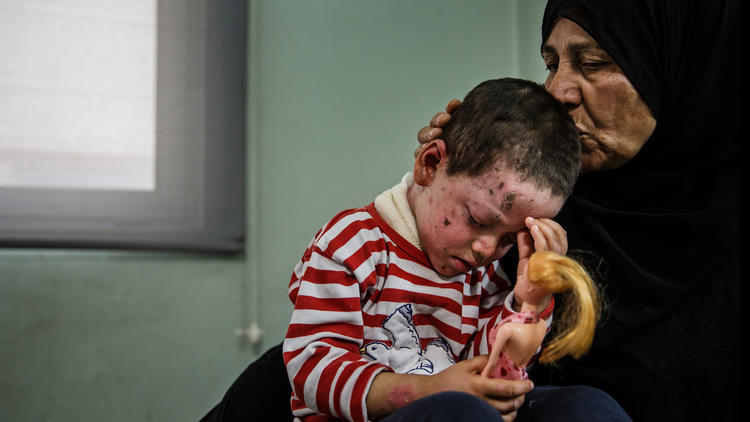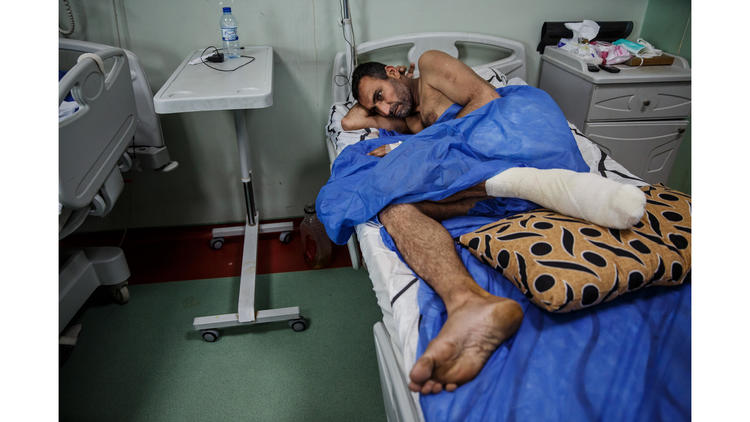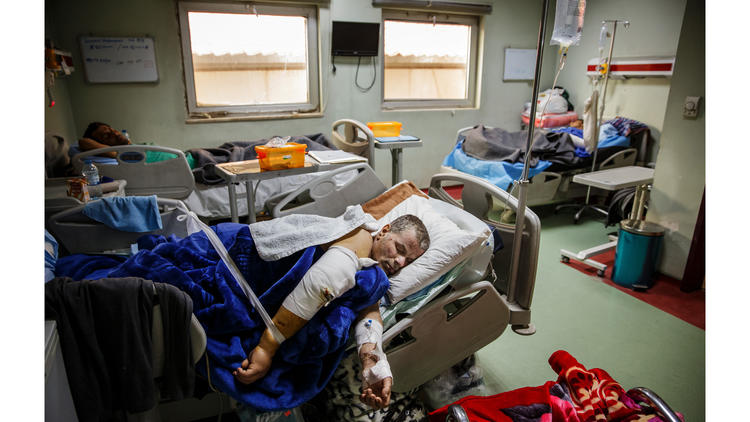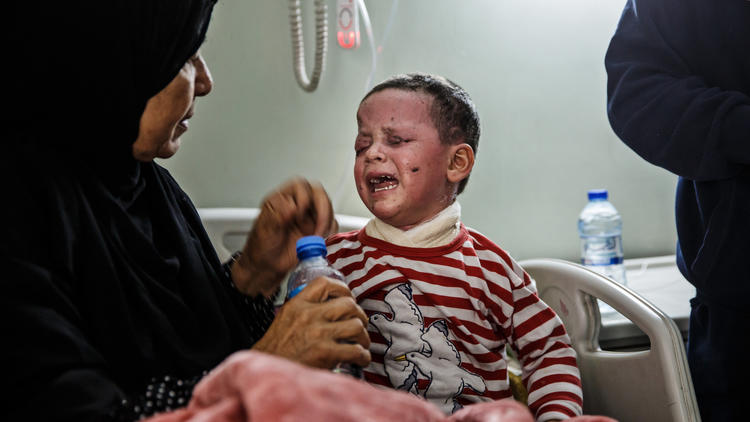Sometimes Hawra asks for her mother. Her father promises they will see her when Hawra gets better. The truth is, his wife is buried next to their neighborhood mosque along with her parents, all killed in a U.S. airstrike March 17 that destroyed their block in Mosul’s Jadidah neighborhood.
The strike is believed to have killed more than 200 people, the highest death toll since the campaign against Islamic State began three years ago, and has drawn international attention to the plight of civilians trapped in West Mosul.
U.S. military commanders concede their airstrike was likely responsible for the deaths, though the outcome of parallel U.S. and Iraqi investigations won’t be completed until later this month.
U.S. commanders say that targeting specialists routinely conduct scans before approving any bombings. But Uribe said Islamic State militants have been forcibly herding civilians into buildings before airstrikes in an apparent attempt to cause civilian deaths.
“We’re here to defeat them,” he said of the militants, “and we’re going to do it the moral way.”
Victims injured by the strike were unsure how the government inquiries might help them. Many are facing dire prognoses after being trapped for days in the rubble-strewn neighborhood without medical treatment. Hawra’s father knows of at least 30 being treated at the same hospital in the northern city of Irbil.
Mutar, 47, had been holding his 2-year-old son Ahmed on his lap, his wife and children in another room, when it hit.
He tried to shield the boy with his body as the house caved in around them, then caught fire.
“I was holding him for two hours,” Mutar said.
Through the smoke and flames, he could hear his 21-year-old son Khaled calling, “Where are you, Daddy?”
“Help me!” Mutar shouted. “Get me out of here! I’m here! I’m your father!”
Khaled found them and managed to pull the toddler out. But he couldn’t free his father: He was trapped by the wreckage, and fainting.
Mutar told his older son: “Take Ahmed and let me die.”
Khaled carried his brother to safety, then returned with neighbors to free his father an hour later. Mutar’s back and foot had been badly burned, but he was grateful to be alive.
The Iraqi government had advised residents to stay in their homes instead of fleeing. People thought multistory houses were the safest, Mutar said, and four or five families were sheltered in many of those larger houses.
“People felt secure,” he said.
Mutar had taken in a family of four. After the strike, he found the bodies of the couple and their two children, ages 6 and 3. He had to bury them in his garden because militants had the area of the airstrike surrounded for days.
“Daesh said, we’re not going to let you go to the army side,” he recalled, using an acronym for Islamic State.
Iraqi soldiers finally reached Mutar’s home four days after the attack.
They took him to a field hospital. By then, Mutar’s foot had turned black.
Mutar was later transferred to the same hospital as Hawra. Doctors had hoped to save his foot, but the color hasn’t improved. Now, Mutar can no longer move it. Recently, new doctors came to see him. Mutar’s cousin knows their specialty but hasn’t told him yet: amputations.
“It’s been two weeks I’m like this: I can’t work, I can’t do anything,” Mutar said. “I’m not a politician. I’m not a soldier. I’m just a truck driver. I just want to go back to my family and be safe.”
The owner was not a militant, but rather a good Samaritan, said Thanoon’s brother, Mubashar. The man had welcomed neighbors who needed a place to hide from the fighting, making space and sharing food.
The airstrike leveled the multistory building and killed all 21 members of Ali Thanoon’s family, including his seven children, though he doesn’t know that yet.
“We’re waiting to tell him,” his brother said outside his hospital room Friday.
Thanoon spent five days trapped under the rubble after the strike, with injuries to his eyes, back and arms. He’s had four surgeries and is facing more. Metal pins jut from his arms. He still can’t walk.
Mubashar Thanoon fears for his own family, still living with him in west Mosul.
“We just want to live, be safe and secure,” he said, insisting that no Islamic State militants had stationed themselves in his brother’s house. “There was no Daesh in his house, not even on the roof. And it still got the airstrike.”
Hawra’s father, Alaa Hasan, had not left his family’s side for 10 days before the strike, fearful that fighters might approach. But they were running out of food.
He left for the store and was gone half an hour when he heard Islamic State fighters shooting next to his house, then two explosions. He sheltered against a wall, then rushed back to find a pile of rubble where his house had stood.
“I saw Hawra under some concrete, yelling,” Hasan, 26, recalled as he stood next to his daughter’s hospital bed Friday. “Her face was black, smashed.”
Her father carried her to safety at his mother’s house nearby, then returned for his wife, Mayada, 37, and his in-laws.
“I saw there was a body without a head, only a leg and this,” he said, pointing to his torso.
He knew it was his wife.
“I wanted to pick her up, but Daesh started shooting,” he said.
It would be days before his cousins were able to bury her at a nearby mosque.
Hasan, a photographer, remained trapped with his daughter and the rest of their family, pinned down by militants. Those caught trying to flee risked getting shot, he said.
Throughout their ordeal, he tried to get Hawra to drink milk and orange juice, but she kept spitting up black liquid “like oil.” Her left foot was broken. She had debris embedded in her eye, face and back.
After three days, they managed to flee and get treatment, first at a field clinic, then about 50 miles east at the hospital in Irbil, where they remained Friday.
No Iraqi or coalition investigators had questioned them. Although other witnesses and Iraqi officials said militants were killed in the strike, Hasan didn’t see any.
“We didn’t see any Daesh die — only civilians,” he said.
Hawra started crying. Her grandmother, Alia Ali, climbed into the girl’s hospital bed to soothe her, next to her stuffed Winnie the Pooh bear.
“I want to know what the government’s plan is,” Ali said. “They didn’t even come to check on us, who’s fine in the hospital, who’s not.”
Hawra stopped crying and sat up.
“I’m fine,” she said, waving and blowing a kiss, eyes closed.
It took her days after arriving at the hospital to speak. She burrows in her blanket, only emerging for sips of water. If her grandmother leaves the room, even briefly, she wails, “Why are you leaving me?”
“Is this how children have to live?” said Ali, 50. “We just want her to get better and be able to open her eyes.”
Doctors have not said when, or if, that will happen.
Hawra’s father knows one thing for certain: They will not return to Mosul.
“I cannot go back,” he said. “I saw too much.”
Source: www.latimes.com/world/middleeast/la-fg-iraq-mosul-airstrike-victims-20170331-story.html





 RSS Feed
RSS Feed